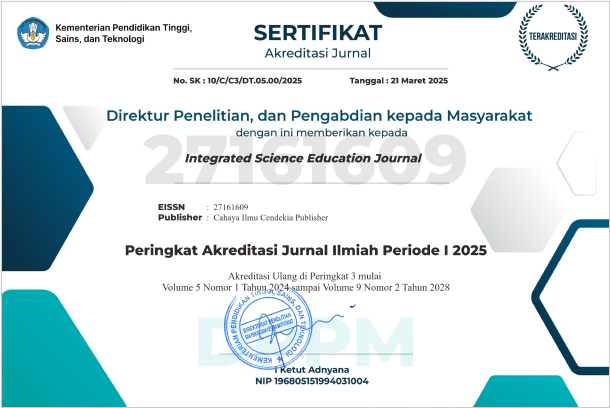Integrating Local Wisdom in E-LKPD: Enhancing Students' Critical Thinking Skills
Abstract
Purpose of the study: This study aims to develop E-LKPD based on CTL containing local wisdom of Ngawi with the help of the liveworksheet website to train students’ critical thinking skills.
Methodology: The research design used by the researcher is R&D research. The development procedure used is the 4D development model (Define, Design, Develop, Disseminate). The trial subjects were class VII D, VII E, and teachers at MTs Negeri 9 Ngawi.
Main Findings: The results of the study showed that the CTL-based E-LKPD had high feasibility, with validation results from material experts of 91% (very feasible), language experts of 76.3% (feasible), and media experts of 91.7% (very feasible). Practicality tests from students and teachers showed positive responses with a very practical category (95% and 91.4%). In addition, the analysis of effectiveness based on learning outcomes showed a significant increase in critical thinking skills of students in the experimental class compared to the control class (p value <0.05).
Novelty/Originality of this study: E-LKPD integrates Ngawi’s local wisdom, namely Seloondo tourism as a learning resource, so that it not only improves students’ critical thinking skills, but also instills ecological awareness and local culture. In addition, the use of the Liveworksheet website makes E-LKPD more interactive, flexible, and innovative than conventional LKPD.
References
“Ministry of Education and Culture of the Republic of Indonesia, 'Vision of Golden Indonesia 2045,' ,” 2022.
N. Hapiza, “Peningkatan Keterampilan Berpikir Kritis Siswa Melalui Model Pembelajaran STEM-PjBL Dengan Pendekatan Etnosains Pada Materi Tata Surya di MTs Negeri 1 Pekanbaru [Improving Students' Critical Thinking Skills Through the STEM-PjBL Learning Model with an Ethnoscience Approach to the Solar System Material at MTs Negeri 1 Pekanbaru] (Doctoral dissertation, UNIVERSITAS ISLAM NEGERI SULTAN SYARIF KASIM RIAU), 2023.
P. Facione, Critical thinking: What it is and why it counts, millbrae, CA: Insight Assessment, 2013.
D. N. Agnafia, “Analysis of students' critical thinking skills in biology learning,” Florea: Journal of Biology and its Learning, vol. 6, no. 1, pp. 45-53, 2019.
OECD, PISA 2022 Results: What Students Know and Can Do, Paris: OECD Publishing, 2023.
A. T. Fiska, “Pengembangan Karakter Kemandirian Siswa Melalui Pembelajaran IPA Bermuatan Etnosains [Development of student independence character through science learning containing ethnoscience],” Esensi Pendidikan Inspiratif, vol. 6, no. 3, 2024.
D. N. Agnafia, and Q. Anfa, “Development of project-based learning electronic student worksheet integrating Ngawi local wisdom to enhance critical thinking skill and environmental caring attitude,” BIO-INOVED: Jurnal Biologi-Inovasi Pendidikan, vol. 7, no. 1, pp. 37–49, 2025, doi: 10.20527/bino.v7i1.20611.
B. Lase, and D. Telaumbanua, “Development of lembar kerja peserta didik (lkpd) based on contextual teaching and learning (ctl) on environmental pollution material class vii smp negeri 4 botomuzoi academic year 2022/2023,” Indonesian Journal of Interdisciplinary Research in Science and Technology, 1(5), 325–344, 2023, doi: 10.55927/marcopolo.v1i5.4788
S. Johnson, Contextual Teaching and Learning: Making It Work in Your Classroom, Thousand Oaks, CA: Corwin Press, 2002.
N. B. Haka, F. G. Putra, P. Biologi, and U. I. N. Raden, “Modul ekosistem kearifan lokal lampung barat berbasis contextual teaching and learning pada kelas X SMA [West Lampung local wisdom ecosystem module based on contextual teaching and learning in class X of high school],” JOBE: Journal Of Biologi Education, vol. 4, no. 2, pp. 124-137, 2021
A. W. Yanti, and A. R. T. Putri, “Pemanfaatan liveworksheets dalam pengembangan e-lkpd numerasi berbasis ke-islaman untuk melatih kemampuan berpikir tingkat tinggi [Utilization of liveworksheets in the development of islamic-based numeracy e-lkpd to train high-order thinking skills],” Circle: Jurnal Pendidikan Matematika, vol. 4, no. 2, pp. 186-200, 2024.
W. Washington, “Thiagarajan, Sivasailam; And Others Instructional Development for Training Teachers of Exceptional Children: A Sourcebook. Indiana Univ., Bloomington. Center for Innovation in Teaching the Handicapped. National Center for Improvement of Educational Systems (DHEW/OE).”
T. Sugiyono, S. Sulistyorini, and A. Rusilowati, “Pengembangan perangkat pembelajaran ipa bervisi sets dengan metode outdoor learning untuk menanamkan nilai karakter bangsa [Development of science learning devices with a vision of sets with outdoor learning methods to instill national character values],” Journal of Primary Education, vol. 6, no. 1, pp. 8-20, 2017, doi: 10.15294/jpe.v6i1.14508
S. Sanimah and Sri Wahyuni, “Analisis kritis pendidikan karakter dalam pembelajaran ipa terpadu dan kaitannya dengan mutu pendidikan [Critical analysis of character education in integrated science learning and its relation to the quality of education],” Jurnal Paris Langkis, vol. 2, no. 1, pp. 83-92, 2021.
F. Munafri, H. Husain, and M. Yunus, “Pengembangan lembar kerja elektronik peserta didik (e-lkpd) berbasis inkuiri terbimbing pada materi asam basa kelas xi sman 1 Soppeng [Development of student electronic worksheets (e-LKPD) based on guided inquiry on acid-base material for class XI SMAN 1 Soppeng],” Edutech: Jurnal Inovasi Pendidikan Berbantuan Teknologi, vol. 2, no. 4, pp. 351-361, 2022.
P. J. Laksono, S. Suhadi, and A. Efriani, “Unveiling STEM education conceptions: Insights from pre-service mathematics and science teachers”, In. Sci. Ed. J, vol. 6, no. 1, pp. 54-61, 2025, doi: 10.37251/isej.v6i1.1387.
N. Haniah, Normality Test Using Liliefors Method, 2013.
U. Usmadi, Testing analysis requirements (homogeneity test and normality test),” Educational Innovation, vol. 7, no. 1, 2020.
M. R. Salsabila, R. Yogica, H. Helendra, and R. Anggriyani, “Meta-analysis: Validity of atlas development as a supplement to high school biology teaching materials”, In. Sci. Ed. J, vol. 6, no. 1, pp. 1-5, 2025, doi: 10.37251/isej.v6i1.1087.
E. Setiawati, H. M. Rahayu, and A. E. Setiadi, “Pengembangan media pembelajaran modul pada materi animalia kelas X SMAN 1 Pontianak [Development of learning media modules on animalia material for class X SMAN 1 Pontianak],” Jurnal Bioeducation, vol. 4, no. 1, 2017.
W. T. Ummah and Y. Yohamintin, “Integrating scientific attitude to realize pancasila learner profile in science learning”, In. Sci. Ed. J, vol. 6, no. 1, pp. 15-23, 2025, doi: 10.37251/isej.v6i1.1318.
I. K. J. Jannah, and O. A. Suciptaningsih, “Pengembangan E-LKPD berbasis CTL pada kurikulum merdeka muatan IPAS [Development of CTL-based E-LKPD in the independent curriculum for science content],” JIIP-Jurnal Ilmiah Ilmu Pendidikan, vol. 6, no. 8, pp. 6164-6172, 2023.
D. D. Lestari, and M. Muchlis, “E-LKPD berorientasi contextual teaching and learning untuk melatihkan keterampilan berpikir kritis siswa pada materi termokimia [E-LKPD is oriented towards contextual teaching and learning to train students' critical thinking skills in thermochemistry material],” Jurnal pendidikan kimia indonesia, vol. 5, no. 1, pp. 25-33, 2021.
D. Apriliawati, S. M. Leksono, and L. Berlian, “Pengembangan buletin ipa tema pangan sebagai sumber energi berbasis contextual teaching and learning (CTL) yang berorientasi pada kemampuan berpikir kritis [Development of a science bulletin on the theme of food as an energy source based on contextual teaching and learning (CTL) which is oriented towards critical thinking skills],” PENDIPA Journal of Science Education, vol. 6, no. 3, pp. 624-630, 2022.
R. Castro, “The Effects of Chemistry Virtual Laboratories in Academic Achievement of Secondary Level Learners: A Meta-Analysis”, In. Sci. Ed. J, vol. 6, no. 1, pp. 24-37, 2025, doi: 10.37251/isej.v6i1.1379.
S. Milliniawati, and W. Isnaeni, “Critical thinking ability, cognitive learning outcomes, and student learning activities in excretion system learning using PBL-Based E-LKPD,” Journal of Biology Education, vol. 12, no. 1, pp. 43-52, 2023, doi: 10.15294/jbe.v12i1.61050.
Copyright (c) 2025 Novita Rahmawati, Desi Nuzul Agnafia, Lucky Amatur Rohmani

This work is licensed under a Creative Commons Attribution 4.0 International License.
Authors who publish with this journal agree to the following terms:
- Authors retain copyright and acknowledge that the Integrated Science Education Journal is the first publisher licensed under a Creative Commons Attribution 4.0 International License.
- Authors are able to enter into separate, additional contractual arrangements for the non-exclusive distribution of the journal's published version of the work (e.g., post it to an institutional repository or publish it in a book), with an acknowledgment of its initial publication in this journal.
- Authors are permitted and encouraged to post their work online (e.g., in institutional repositories or on their website) prior to and during the submission process, as it can lead to productive exchanges and earlier and greater citation of published work.







.png)
.png)






